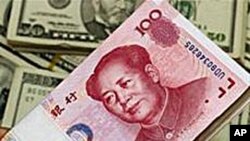Asian governments are struggling to manage strong capital flows that could threaten their economies. But international finance leaders worry such efforts may destabilize the global financial system.
As the yen neared a 15-year high against the dollar Friday, Prime Minister Naoto Kan said Japan will continue to watch for "excessive" moves in the exchange rate and will take necessary action.
Japan's central bank recently has stepped into the markets to weaken the yen. A strong yen hurts exports, which are crucial to the country's economic recovery.
But international finance leaders fear market interventions could trigger a cascade of similar actions by other central banks, leading to a "currency war."
International Monetary Fund Managing Director Dominique Strauss Kahn warned Thursday against using currencies as "weapons" to gain trade advantages.
In the past, Asian central banks aggressively managed their currencies. Over the past decade, they did significantly less management, but in recent weeks, currency traders say there have been new signs of intervention.
Song Seng-Wun, chief economist of the bank CIMB in Singapore, says Asian central banks are not trying to stop their currencies from rising. Instead, they are managing the appreciation so it will not be too disruptive to their economies.
"They're just moderating it to make it less destructive and for businesses, more predictable," said Song Seng-Wun. "Because if you allow it to move too fast, it makes planning very difficult, if not impossible."
However, the region's largest economy, China, tightly controls its currency, the yuan. China's trading partners want the yuan to appreciate by 30 percent or more to correct what they say is an undervalued currency. Beijing argues doing so would force many Chinese manufacturers to shut down.
Some economists say Asian central bankers are less worried about export competitiveness than about the dangers of strong capital inflows.
Song says the weak economies in the U.S. and Europe have led investors to move money to more profitable markets in Asia's fast-growing economies. That pushes up prices, including the value of Asian currencies.
In recent days, the Thai baht and Malaysian ringgit hit 13-year highs against the dollar. The Korean won rose to a five-month high, while the Indonesian rupiah neared three-year high.
"It's like the globe is one big tray of water and the flow is going from the side, which is being held up toward the other side, which is Asia," said Song. "So governments are trying to balance trade a little bit, rather than letting the money flowing through make the exchange rate go up very fast, which in turn could attract even more [money]."
The problem with that foreign capital can flow out very quickly in a crisis.
In the mid-1990s, Asia saw large inflows of capital, which was quickly pulled out when economies weakened in 1997. That led to a rapid depreciation of currencies despite intense market intervention by central bankers. The resulting economic crisis led to severe recession and thousands of failed businesses across the region.
Shin Jang-sup is an economics professor at the National University of Singapore and previously was an adviser to the South Korean Ministry of Finance. He says Asian central bankers face a more serious problem today than in 1997.
"Their interest rates are historically low, and if they lower their interest rates further they face inflationary pressure," said Shin Jang-sup. "So it's very difficult. Also, after the Asian financial crisis, they carried out various market reforms to facilitate international flows of capital, so it's very difficult to re-introduce some form of capital control. Also the amount of money is much larger than before."
The International Institute of Finance says $825 billion in capital will flow to emerging markets this year, while the Asian Development Bank says more than $200 billion stayed in Asia last year.
On Thursday in Washington, the IMF's Strauss-Kahn said while capital flows are important to global development, he recognizes the dilemma countries face.
"In the short term, we may not be able to have a revaluation of a currency enough to mitigate the effect of the capital flow," he said. "Then you have prudential action that can be taken. Also, you can accumulate reserves and at the end, as we say for months now, we can understand that some element of capital controls can be put in place."
Given its complexity, Strauss-Kahn says, the best way to address the issue is through cooperation among the Group of 20 nations.
In 1985, Japan, the United States, Germany and Britain signed the Plaza Accord, and allowed the dollar to weaken to help Washington narrow its trade deficit and recover from a severe recession.
Whether a similar international agreement can be cobbled together is among the topics international finance leaders are expected to discuss this week in Washington at the IMF and World Bank annual meetings. Government leaders are likely to also take up the issue at the G20 summit in Seoul next month.
Asian Economies Struggle With Capital Flows, Finance Leaders Warn of 'Currency War'




